Sept 21, 1968: Colorado 28, Oregon 7
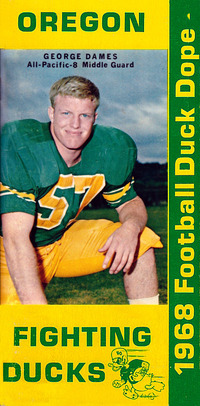 In the summer of 1968, Richard Hooker’s novel “MASH” – the source for the eventual movie and TV series about Korean War medical units – was on the bestseller lists. After two weeks of fall practice, Jerry Frei’s Fighting Ducks could have filled a MASH ward without a shot being fired.
In the summer of 1968, Richard Hooker’s novel “MASH” – the source for the eventual movie and TV series about Korean War medical units – was on the bestseller lists. After two weeks of fall practice, Jerry Frei’s Fighting Ducks could have filled a MASH ward without a shot being fired.
Projected starting QB/P Tom Blanchard, the gunslinger from Grants Pass, whose knee had given him trouble all season in ‘67, was still questionable. LBs Dane Smith (knee) and Gunther Cunningham (shoulder) sat out multiple practices, as did all-Coast middle guard George Dames (foot). In all, 11 players missed multiple practices and scrimmages.
But Frei, the world’s self-styled “greatest optimist,” chose to accentuate the positive. He had 11 seniors in the first string, and would only be starting three players without varsity experience. He insisted the Ducks would be better in 1968, although he allowed the Pac-8 would be better overall, and that an improved team on the field might not see that improvement reflected in its record.
Oregon’s schedule didn’t help; Colorado and Ohio State on the road, and the only team missed in the Pac-8 was UCLA, an unfortunate miss, as the Bruins went winless in conference play. The Pac-8 “Skywriters,” that roaming group of local media pundits, agreed in consensus with Frei: the Ducks would be better, but hard pressed to have a winning season.
Jerry FreiFrei.. is an outspoken optimist who has all the fire of Norman Vincent Peale. What positive thinking will accomplish against USC, Oregon State and Ohio State is open to debate, however…” – Jim Perry, Los Angeles Herald-Examiner
Let me assure you that Frei respects the magnitude of the hardship and probable disaster which the future can bestow upon the Pac-8’s poor people. Right now, Oregon and Washington State are ‘poor people.” – Joe Hendrickson, Pasadena Independent Star-News
[They’ll] play well enough to take a couple of good bounces and beat about anyone.. but to go better than 4-6 the Ducks would need much luck.” – Harry Missildine, Spokane Spokesman-Review
Frei was excited about his receivers, particularly sophomore Bob Newland, who had been singled out by Sports Illustrated as one of the top newcomers in college football. “Our biggest trouble has been getting the ball to him,” Frei noted. “He catches the badly thrown ball extremely well and he can come back for the underthrown pass and catch it without going down.” This was a skill set that would prove necessary in 1968.
Blanchard eventually sat out the entire 1968 season. The battle at quarterback would be between senior Eric Olson and juniors John Harrington (father of you-know-who) and Alan Pitcaithley. Recall that in 1967, the Ducks played musical chairs at quarterback, and Frei didn’t settle on Olson as the starter until Blanchard was knocked out for the season against Washington. Still, Olson had started the last five games, including the only two wins, and was the #3 returning passer in the Pac-8, behind Steve Sogge of USC and WSU’s Jerry Henderson.
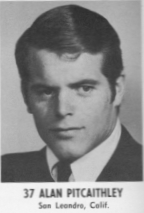 But Frei named Pitcaithley, the athlete of the group, the starting punter and one of the fastest players on the team, as the starter on opening day, even though he was only “average” as a passer (Frei’s word); last year, Pitcaithley had only thrown five passes, all from halfback, all incomplete. “Alan has been throwing real well in practice,” he told reporters on Friday, “and we like to think he will get the job done under fire. Remember, he earned the job on his own merits and not merely because Tom Blanchard was unable to play.”
But Frei named Pitcaithley, the athlete of the group, the starting punter and one of the fastest players on the team, as the starter on opening day, even though he was only “average” as a passer (Frei’s word); last year, Pitcaithley had only thrown five passes, all from halfback, all incomplete. “Alan has been throwing real well in practice,” he told reporters on Friday, “and we like to think he will get the job done under fire. Remember, he earned the job on his own merits and not merely because Tom Blanchard was unable to play.”
Now, Frei was always a defense-first coach, and he had to have known his team had holes to fill. His all-American cornerback, Jim “Yazoo” Smith, had graduated, and only rover Omri Hildreth had significant game experience. There was talent up front, particularly in the middle with the solid run-stopper Dames and at linebacker, but the feeling was that teams that could throw would see success, at least early in the season.
And Colorado could throw. They’d proven that the previous year, when sophomore sensation Bobby Anderson lit up the Big Eight after running and passing the Buffs to a win in the first game at Autzen. Colorado had gone on to a 9-2 record and a 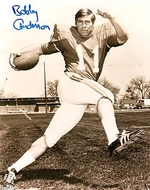 Bobby AndersonBluebonnet Bowl win over Miami, and the experts had them as 20 point favorites over the Ducks. But head coach Eddie Crowder had injury problems of his own; two starters on the defensive line, end Dave Bartlett (shoulder) and tackle Bill Brundige (end). Crowder was concerned that Oregon’s starting backfield – which averaged 215 pounds, between Pitcaithley, Claxton Welch and Andy Maurer – might overpower his new starters. (Crowder didn’t know Maurer, at 232 lbs a load anywhere, had been moved to tight end; his replacement, sophomore Greg Marshall, went just 200 dripping wet, dropping the average ten pounds.)
Bobby AndersonBluebonnet Bowl win over Miami, and the experts had them as 20 point favorites over the Ducks. But head coach Eddie Crowder had injury problems of his own; two starters on the defensive line, end Dave Bartlett (shoulder) and tackle Bill Brundige (end). Crowder was concerned that Oregon’s starting backfield – which averaged 215 pounds, between Pitcaithley, Claxton Welch and Andy Maurer – might overpower his new starters. (Crowder didn’t know Maurer, at 232 lbs a load anywhere, had been moved to tight end; his replacement, sophomore Greg Marshall, went just 200 dripping wet, dropping the average ten pounds.)
**
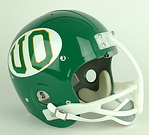 God bless HelmetHutThe road trip didn’t start off well. Frei had hoped to get to Boulder early enough to run through some drills Friday afternoon, but after an early takeoff the team’s chartered DC-9 suffered mechanical failure and was forced to land in Salt Lake City. Frei took advantage of the repair time to run through a short drill on a field near the airport. Then, continuing to Denver, a stretch of bad weather made the plane bounce violently, giving the passengers white knuckles and some anxious moments.
God bless HelmetHutThe road trip didn’t start off well. Frei had hoped to get to Boulder early enough to run through some drills Friday afternoon, but after an early takeoff the team’s chartered DC-9 suffered mechanical failure and was forced to land in Salt Lake City. Frei took advantage of the repair time to run through a short drill on a field near the airport. Then, continuing to Denver, a stretch of bad weather made the plane bounce violently, giving the passengers white knuckles and some anxious moments.
And on entering their quarters in the visiting press box on game day, the Duck assistant coaches found a noose hanging in the middle of the booth. They cut it down, but the public execution went on unabated.
After a scoreless first quarter, the Buffs adjusted to Oregon’s line play and nullified the running of Claxton Welch and Greg Marshall, forcing Pitcaithley to throw – exactly what Frei had feared. When his QB wasn’t running for his life, pursued by Colorado’s speedy linebackers, he was overthrowing his receivers, and his first eight passes fell harmlessly to the turf.
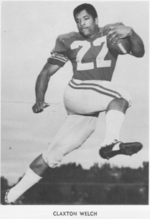 In the 3rd quarter, with the Ducks trailing 14-0, they showed some life. Safety Jim Franklin returned a punt 50 yards to the Colorado red zone, and after a run and a penalty, Pitcaithley finally completed a pass, shaking off another backfield tackle and, on what he called a “desperation throw”, hit Denny Schuler in the end zone from 20 yards out.
In the 3rd quarter, with the Ducks trailing 14-0, they showed some life. Safety Jim Franklin returned a punt 50 yards to the Colorado red zone, and after a run and a penalty, Pitcaithley finally completed a pass, shaking off another backfield tackle and, on what he called a “desperation throw”, hit Denny Schuler in the end zone from 20 yards out.
After a Colorado punt, Pitcaithley completed his final pass of the day, finding Schuler again over the middle near midfield. Momentum! Until the next play, anyway, when Claxton Welch lost the handle on a dive play; the ball popped fifteen feet into the air and two Colorado defenders played volleyball with it before defensive end Mike Schnitker corralled the fumble. The Buffs embarked on a ten play, 50 yard drive, with Anderson running it in from five to make it 21-7.
Just like in 1967, Frei started rotating his quarterbacks, inserting Eric Olson, who immediately hit Greg Lindsey for 45 and Schuler for 15. But three straight incompletions into the end zone killed any threat, and Ken Woody’s field goal attempt went wide.
Colorado then ate up most of the fourth quarter with a 14-play drive that ended in a meaningless touchdown with 32 seconds remaining by fullback Tom Nigbur. Final: 28-7; the experts had pegged it pretty well.
Frei was upset after the game.
I’ve never seen us tackle that badly.. They took our quarterback away from us more than I thought they would. They nullified him. They never let us get to the corner..
We just didn’t block or tackle well enough… It wasn’t individuals; it was a team effort.”
And, although they were relatively healthy before the game, the MASH ward had returned to haunt them. Bob Newland, the flashy flanker from North Eugene, injured an ankle. Tight end Andy Maurer dislocated his shoulder while blocking on a run. Gunther Cunningham reinjured his shoulder.
The Ducks were unanimous in their admiration of the skills of Bobby Anderson. DB Cam Sinclair, whose shoestring tackle of the Buffs helmsman saved a touchdown in the second quarter, said “he’s a great quarterback… He spins and gets off a lot of tackles. He didn’t go down with just one or two guys.” DB Jim Franklin: “You’ve got to tackle him with the whole team.” George Dames: “He was great, simply great… He hurt us on so many plays it’s difficult to remember them all.”
**
As widely predicted, Oregon ended the season at 4-6, 2-4 in conference. There were a couple of high points — a 3-0 win over Washington in Seattle, with Ken Woody hitting the game-winning FG with under 5 minutes remaining, and a heartbreaking 20-13 loss in the mud to mighty USC in Eugene, after outgaining the Trojans 359-196 and holding OJ Simpson to 67 yards on 25 carries. And the last unofficial Mud Bowl was played on Homecoming weekend November 9, with the Ducks throttling WSU like pigs in a trough. (This was the last game played on grass, or what was left of grass, at Autzen, as the below-ground-level surface was found to retain too much water to establish a solid field. AstroTurf would be installed for the 1969 season. )
 Rocky Pamplin vs WSU. (University of Oregon Archives)
Rocky Pamplin vs WSU. (University of Oregon Archives)
A shot at a winning season died on the road over the last two games – a four-touchdown pasting at Berkeley, and then the ultimate insult, losing the sixth consecutive Civil War, 41-19 in Corvallis.
George Dames and Omri Hildreth were both named to the all-conference first team; Dames was again All-Coast.
Waiting in the wings for 1969 were some super sophs, including Tom Graham, Greg Specht, Leland Glass, and a kid from Tacoma named Bobby Moore, and a big kid from Sunset High in Beaverton coming off a redshirt named Tom Drougas. And a Bay Area QB with a cannon arm named Fouts was a freshman.
Jerry Frei was getting it going. All he needed was time. He didn’t know he only had three more years.